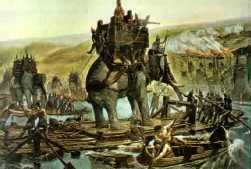
In 218 B.C., Hannibal began the most daring military move in history, that of invading Rome by way of the Alps. But why did this African military genius decide to war against Rome?
Before Hannibal's birth, the Romans ruled Italy, and the Carthaginians ruled Carthage in North Africa. The Carthaginians also ruled the Mediterranean Islands of Corsica, Sardinia, and Syracuse (now know as Sicily). The Carthaginians were content as things were, but the Romans were military expansionists. So the Romans broke their treaty with the Carthaginians by expanding their empire into Sicily, and the First Punic War began (264 B.C.).
In 247 B.C., Hamilcar Barca took command of the Carthaginian army and his son, Hannibal, was born. Hannibal was born to one of the most distinguished families in Carthage--the Barcas.
After losing a decisive sea battle, the Carthaginians recalled Hamilcar Barca and sued for peace. Rome, however, demanded not only Sicily, but Corsica, Sardinia, and all the islands between Sicily and Africa. In addition, the Carthaginians were compelled to pay a large tribute. In order to recoup their losses, the Carthaginians rebuilt their empire in Spain. In 237 B.C., Hamilcar and Hannibal left for Spain. It took nine years for Hamilcar to conquer or win over the native tribes of Spain. These tribes were no match for the Carthaginian's training in disciplined warfare. As a result, all of the land south of the Ebro River in Spain became New Carthage. In 230 B.C., Hamilcar was killed in battle, and command of the army was left to his son-in-law, Hasdrubal.
During all of Hannibal's years in Spain, first under his father and then under his brother-in-law, Hasdrubal, he was taught the world of the soldier. When Hasdrubal was murdered in 221 B.C., there was never a doubt as to his successor. It was inevitable that upon the death of Hasdrubal, Hannibal would succeed him. At the age of twenty-six, he was chosen by the army as their new commander.
Saguntum was a province of New Carthage inhabited by Greeks. After the Greeks attacked some of the tribes in New Carthage, the Romans sided with them and declared themselves protectorates of Saguntum. Knowing that the long term goal of the Romans was to gain control of New Carthage, Hannibal decided to make the first move. He attacked Saguntum, beginning the Second Punic War (218 B.C.) The Romans prepared to invade New Carthage, but Hannibal was not preparing a defense strategy.
With thirty-seven elephants, Hannibal's army climbed through the Pyrenees, across the Rhone, over the Alps and into Italy. The Roman general Publius Cornelius Scipio tried unsuccessfully to check Hannibal's advances into Italy. Attempting another strategy, he attacked Carthage but was defeated and killed. For the next sixteen years, Hannibal successfully waged war against every Roman legion sent to defeat him. He left a path of destroyed cities and bridges and a huge Roman death toll.
Rome had lost half a million men in battle, when Publius Cornelius Scipio's son, called Scipio the Younger, took command. Scipio the Younger decided to take the risk of striking at Carthage. In 204 B.C., Scipio and an army of 25,000 men landed in Carthage. Hearing of the invasion, Hannibal headed back to North Africa. On the plain of Zama, Scipio and Hannibal aligned their armies for battle. Hannibal's soldiers fought a courageous fight, but they were outflanked and defeated by the powerful Roman legions. Hannibal then sent word to Carthage, "We have lost not only a battle, but the war. Accept the terms of peace offered."
After the ratification of a peace treaty, Hannibal became the Chief Magistrate of Carthage. Hannibal increased the stability and prosperity of Carthage so well that Carthage soon regained its place as the commercial capital of the western Mediterranean. The Romans were not only nervous about a quick recovery for Carthage, but were afraid that Hannibal would wage another war. In 195 B.C., the Romans demanded his arrest. Hannibal fled Carthage beginning a life of wandering and exile. In 182 B.C., to avoid capture by the Romans, Hannibal committed suicide by drinking a vial of poison.
An interesting fact: the Roman General, Scipio the Younger, became forever known as Scipio Africanus, honoring his defeat of the great African general Hannibal.
Source: Rome in Africa, by Susan Raven
By Yvonne Clark
Yvonne Clark is a researcher and public lecturer currently residing in Los Angeles, California. She had recently returned from an educational tour of Bahia, Brazil, and has done extensive research on Moorish Spain.



